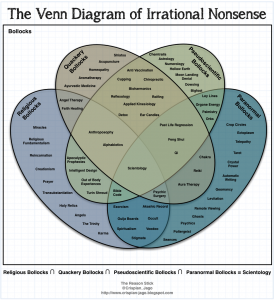Sep
11
2015
 I have long held that one of the best ways to gauge the intellectual integrity of an individual or a group is to note how they deal with bad information or a bad argument that seems to support their position. You get points for rejecting an unsound argument or unreliable data even when it could be used to defend your side.
I have long held that one of the best ways to gauge the intellectual integrity of an individual or a group is to note how they deal with bad information or a bad argument that seems to support their position. You get points for rejecting an unsound argument or unreliable data even when it could be used to defend your side.
The flip side of this is acknowledging valid points that are on the other side of the argument. I will sometimes present what I feel is a rock-solid point for one side to an opponent, just to see how they will deal with it.
Of course it is far easier to point such behavior out in others, more difficult to police it in yourself. This is why constant reminders to value process, integrity, and fairness over any particular position is critical to skeptical inquiry.
Further, there is a range of bad responses to invalid points that can be exploited to support your position. In extreme cases ideologues will take the bad argument as total vindication. They will do a virtual victory dance, spike their fact in the end-zone, and turn up their self-righteousness to 11. Then you know you are dealing with someone with effectively zero intellectual integrity.
Continue Reading »
Sep
10
2015
Those who accept the consensus that the Earth is warming due to human activity (anthropogenic global warming or AGW) point to declining Arctic sea ice as one line of evidence to support this conclusion. Those who do not accept the AGW consensus claim that Arctic sea ice is not declining, or at least we have insufficient data to reach such a conclusion.
What I like about this controversy is that it is about data. It is a fake controversy, driven by political ideology, but none-the-less we can sink our teeth into the data and see which side has the better position.
Arctic sea ice varies throughout the year, growing in the winter and melting in the summer. Therefore any year-to-year comparisons need to take this seasonal variation into account. Scientists use the summer minimum as one measure of the extent of Arctic sea ice for that year. You can also look at the winter maximum.
Sea ice can be measured in square miles, essentially the amount of area covered by ice. It can also be measured in thickness, and the two measures can be combined to calculate the overall volume of ice.
Continue Reading »
Sep
08
2015
 There are endless scams and dubious products out there. I could tackle one every day and never get to the end, because more would crop up faster than I could take them down. That is why I try to develop general themes, so that my readers can better identify dubious claims for themselves.
There are endless scams and dubious products out there. I could tackle one every day and never get to the end, because more would crop up faster than I could take them down. That is why I try to develop general themes, so that my readers can better identify dubious claims for themselves.
There are also types of scams that involve similar themes. For example, there are many types of “magic water” out there – these are often just plain water, perhaps with vitamins or minerals added, that is said to be treated in some new sciencey way that renders it better water. Water has a pre-existing wholesome health halo around it, so it is a great subject for snake oil.
The bottled water industry has proven that you can get people to pay ridiculous amounts of money for what is essentially tap water. The “magic water” industry is just taking it one step further.
Continue Reading »
Sep
04
2015
 UK’s College of Policing has released their draft Authorised Professional Practice on missing persons investigations (there is a public comment period open until October 9). This might not seem that interesting, but it is getting some attention because of their recommendations regarding the use of psychics.
UK’s College of Policing has released their draft Authorised Professional Practice on missing persons investigations (there is a public comment period open until October 9). This might not seem that interesting, but it is getting some attention because of their recommendations regarding the use of psychics.
Here is the entire section under “Psychics:”
High-profile missing person investigations nearly always attract the interest of psychics and others, such as witches and clairvoyants, stating that they possess extrasensory perception. Any information received from psychics should be evaluated in the context of the case, and should never become a distraction to the overall investigation and search strategy unless it can be verified. These contacts usually come from well-intentioned people, but the motive of the individual should always be ascertained, especially where financial gain is included. The person’s methods should be asked for, including the circumstances in which they received the information and any accredited successes.
Let’s break this down a bit: The first half is reasonable. Tips from alleged psychics cannot be ignored because people may have obtained information in some other way – from their own investigation or because they have a connection to the case – and are just claiming the information is “psychic” to obscure how they came by the information or to opportunistically exploit the case for their own reputation. Saying that such information should be viewed “in context” is therefore reasonable.
Continue Reading »
Sep
03
2015
 One burning question that comes up in skeptical circles is whether or not people who believe in the paranormal, are highly religious, or are enamored of conspiracy theories think differently than skeptics. Obviously they have different beliefs, but the question is whether or not their brains function differently in some respects from people who are more rational and scientific.
One burning question that comes up in skeptical circles is whether or not people who believe in the paranormal, are highly religious, or are enamored of conspiracy theories think differently than skeptics. Obviously they have different beliefs, but the question is whether or not their brains function differently in some respects from people who are more rational and scientific.
It certainly seems as if this is the case, but being skeptics we understand the irony of relying on intuition to conclude that other people rely more on intuition. Fortunately we have some psychological research to shed light on this question, including a recent study I will discuss below.
First let me dispense with the obvious false dichotomy – we should not think of this question as if there are two distinct types of people. Psychological studies will often do this, but they are simply dividing a continuum down the middle, or are only considering people at either end of the spectrum.
Continue Reading »
Sep
01
2015
 Getting sufficient sleep is very important to overall health. It is an often overlooked aspect of health. I frequently have patients with multiple complaints who inform me, only when asked, that they have terrible sleep. They did not make the connection between their sleep and their symptoms, however.
Getting sufficient sleep is very important to overall health. It is an often overlooked aspect of health. I frequently have patients with multiple complaints who inform me, only when asked, that they have terrible sleep. They did not make the connection between their sleep and their symptoms, however.
Good sleep has been tied to longevity. A review of studies found that getting <6 hours of sleep on average per night was associated with a 12% increased risk of death. The same review found that getting >9 hours of sleep a night was associated with a 30% increased risk of death.
It is difficult to determine cause and effects with these studies. Sleep may simply be a marker for other health variables. People who sleep over 9 hours, for example, may do so because they are unhealthy for other reasons.
Even still, it is plausible that lack of sleep is stressful to the system, especially brain function, and therefore sleep disorders should be identified and treated. Don’t overlook the importance of good sleep.
Continue Reading »
 I have long held that one of the best ways to gauge the intellectual integrity of an individual or a group is to note how they deal with bad information or a bad argument that seems to support their position. You get points for rejecting an unsound argument or unreliable data even when it could be used to defend your side.
I have long held that one of the best ways to gauge the intellectual integrity of an individual or a group is to note how they deal with bad information or a bad argument that seems to support their position. You get points for rejecting an unsound argument or unreliable data even when it could be used to defend your side.









